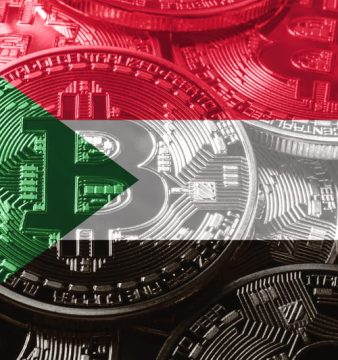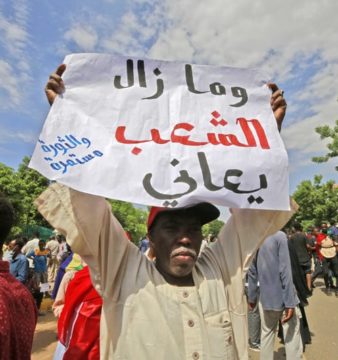Al Bashir Created A Ripe Environment for Colonialism in Sudan

Slavery is when two groups of people wage war against one another. The victors take the defeated as slaves, the former would then either sell the latter or place them in forced servitude. Traditionally, slavery was a by-product of war. With the advancement of civilisation, comes the need for eccentric ways to flaunt wealth gluttonously, and slavery was used for a time to satisfy that need. Of course, some civilisations were more ‘decadent’ than others.
Slavery in Africa
In Africa, however, during the 16th century and onwards, wars were being increasingly waged for the ultimate purpose of slavery. A recent study found that 9.3% of West Africans were sold as slaves and shipped to America during the period of 1701-1850. According to a study conducted by the University of Glasgow, there are two genesis to this phenomenon. Firstly, the underdeveloped technologies used in Africa at the time, and secondly, the fragmentation of African societies and groups.
The technological advances in Europe during the 16th century and beyond necessitated two factors of production to actualise the awesome economic potential: land and unskilled hard labour. For land, European imperial forces set sail to the ‘unknown/new’ world, where land was abundant, but was occupied by the native population. And so, with the help of advanced weaponry, there were mass exterminations and ethnic cleansing. The first factor was satisfied, the focus now was directed towards unskilled hard labour. It was not uncommon for Europeans to use serfs, on the contrary, serfdom was rife in Europe. It is particularly pertinent when discussing this piece of history to discriminate between serfdom and slavery, in that the serfs were able to have families while slaves were just individuals, there are other differences but this is perhaps the most significant. Nonetheless, slavery was available in Europe, the word ‘slave’ originates from ‘slav’, who were the major ethnicity in eastern Europe. Though slaves were available in Europe, and indeed in Asia, Africa and other continents, there were two reasons that made West Africa especially attractive to European buyers; inhomogeneity and magnitude.
That is, in most places around the word, apart from parts of Africa, there were well-established major religions and statehoods that gave people a sense of belonging and togetherness. In fact, in Islamic communities, it was prohibited by divine law to take another Muslim as a slave. In Europe, though many wars were waged. Europeans still saw one another as belonging to the same religious background. This group phenomenon was not as prevalent in Africa. Caveat aside, Asia, Europe and indeed the Arabian Peninsula had plenty of slaves, however, not in the quantity needed to sustain the new economic enterprise to mass produce sugar, tobacco and other crops in the Americas and Caribbean. The aforementioned wars that were perhaps exclusively instigated for slave gain purposes proved to be advantageous for the European buyers. Hence, the mass exodus of African slaves to the Americas. Of course, it should be stated that in order for Europeans to sustain this economically beneficial traffic of slavery, scientific, political and religious propaganda was being perpetuated by scientist, politicians and clergymen – philosophers are not exempt from the list. One could argue that this propaganda is still being perpetuated today. This propaganda gave way to ideas of racial superiority, eugenics and other such nonsense.
Corrupt politicians
So, what does this have to do with the current president of Sudan? Well, history tells us that there are certain prerequisites that need to be fulfilled in order for a society to be more susceptible to colonialism. After the cruel practices of dehumanising members of society, and ravishing the land by the native, the foreigner mimics the behaviour of the native. The prerequisites are societal fragmentation and technological backwardness. Sudan’s Al Bashir has managed to achieve both, with the help of his advisors and other corrupt politicians, namely Nafie Ali Nafie, Salah Gosh and others. I present here a number of practices by the current Sudanese government that has created a suitable atmosphere for colonialism. Firstly, the persistence of racially motivated disparities and a state of constant civil war, that negatively affected Sudanese people from western and southern Sudan throughout the dictatorship’s seemingly endless reign, has not only lead to the country’s split, but has placed southerners in the ‘other minority’ demographical categorisation. Essentially, disenfranchising and fragmenting.
Second, war profiteering by high ranked officials through exporting of natural resources. It has been reported that military personnel and politicians have used the war to mask their business ventures. Third, the diaspora of the educated youth; the oppressive economic and political reality in Sudan has either squashed the intellectual ambitions of the youth, or forced them to leave Sudan in search of a more intellectually friendly atmosphere. This has shackled Sudan to an existence of technological backwardness since the 1990s. And since, Sudan has been bleeding doctors, engineers, poets, novelists etcetera, and for the many that had not and do not have the opportunities to allow their brilliance to flourish. They are trapped in a precarious state of futility. Fourth, is the cavalier and willing attitude of the government to prostitute Sudanese land to foreign agricultural enterprises. Nowhere better is this exemplified than in the case of Kenana Sugar Company in Sudan, one of the biggest sugar production companies in Africa, is mostly owned by the Gulf Cooperation Council (GCC) countries.
It should be noted that the repetition of history is never exact. So, what does/will modern-day colonialism look like? To use a crude example, in 2015, the government of Sudan has traded military troops for money to help the Saudis in a proxy war against Iran in Yemen. With the exaggerated estimates suggesting US$2 billion per 1,000 soldiers, soldiers that are not strategically placed, rather they are deployed to hotspot war zones. Perhaps that is too crude an example. Today, we are witnessing Chinese mega companies coming in to Sudan with its own labour force and technologies to build infrastructure and giant agricultural projects at their own expense, to be paid by Sudan at a later date. This is, as the British did in Sudan at the turn of the 20th century, building the railways and office buildings, for administrative work and to move their products, the benefit of the railway to the native was collateral. Of course, China’s use of sophisticated economic and credit loan strategies to entice and trap governments is one of the main differences. Another is, there is not the ideology of racial superiority. It should be noted that China is not the only country benefitting from Africa’s political and economic disarray, nor is Sudan the only country that is susceptible to corruption.
The solution
There are two types of problems that need to be addressed, immediately and eventually. Addressing one without the other could prove to be calamitous. To address the immediate problem without planning for the eventual, as is done across Africa today, would fashion a passive reality where any catastrophe would be met with charity and there will be no accountability. Similarly, to address the eventual problems without the immediate would forsake the most devastated people. The immediate problems are the currency depreciation, mass poverty, the effects of civil war, etcetera. The eventual problems are regime change, education system, technological innovation, establishing a democracy etcetera. My remarks on this is that we, as citizens of Sudan trying to change and influence change, tend to focus on one dimension of the problem, and miss the entire picture. We also fear that change will lead to another Libya, Egypt or Syria.
There needs to be change from inside the political sphere and outside. That is, scrutinising and protesting against the system is equally important as infiltrating the political stratum. The reason why I say this is twofold, firstly no effective change will happen in Sudan without changing policy, for example today in Sudan the money that is provided to government staff or NGOs that are supposed to be going to the underprivileged, are used on hotels where the fat cat staffer lounge lavishly on the coloured velvety chaise lounge of the five-star hotels of Khartoum, or are used for travel purposes. This is just one example of unaccountability, and how positive initiatives and policies are not monitored. Secondly, the smooth transition from a dictator to a democracy needs to be without bloodshed. While the demise of this regime is eminent, it should not collapse on the people, the retaliation should affect no one physically, when the time is optimal decent politicians need to step up, and ensure no casualties.
 Currently residing in Khartoum and Nottingham, Mohamed Khougali is a person-centred psychotherapist and a Leftist activist. He occasionally writes articles on politics, psychology and history. He’s written for Mondoweiss, The Psychologist, The Canary, Middle East Monitor and others.
Currently residing in Khartoum and Nottingham, Mohamed Khougali is a person-centred psychotherapist and a Leftist activist. He occasionally writes articles on politics, psychology and history. He’s written for Mondoweiss, The Psychologist, The Canary, Middle East Monitor and others.




